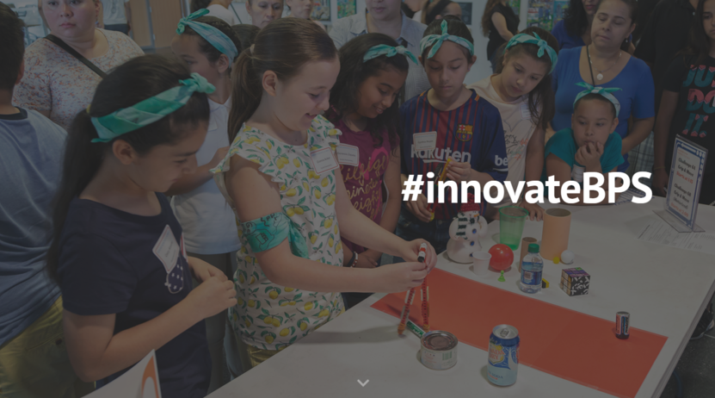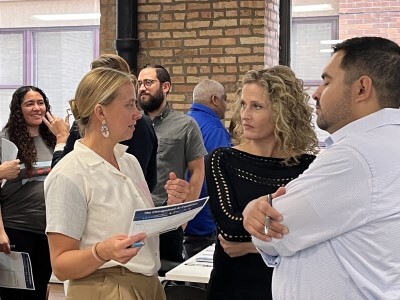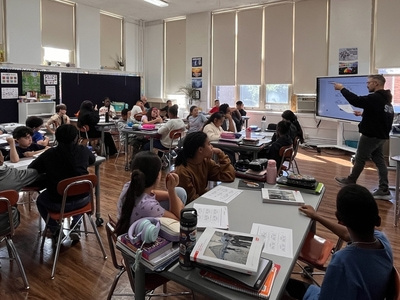Professional Learning
Innovation Pathways: A Personalized Professional Development Approach
Topics

Educators are the lead learners in schools. If they are to enable powerful, authentic, deep learning among their students, they need to live that kind of learning and professional culture themselves. When everyone is part of that experiential through-line, that’s when next generation learning thrives.
To ask that educators create and maintain personalized pathways for students is to require that those same pathways are presented to educators.
Like most cities with thriving economies, Greater Boston is taking advantage of the Fourth Industrial Revolution and its implications for the future of work and play. Unfortunately, many of our communities do not have access to the opportunities shaping our future.
For Boston Public Schools' (BPS) Office of Innovation, this inequity remains evident as the team works to not only close the opportunity and achievement gaps students face, but to close the innovation opportunity gap that separates students from jobs of the future. To do so, we have asked ourselves: "How might we activate adult capacity to redesign learning environments in a way that gives students access to the jobs of the future?"
How might we activate adult capacity to redesign learning environments in a way that gives students access to the jobs of the future?
Teachers Deserve Choice as Learners Too
Learning should resemble a variety of unique threads—passion, profession, innovation, and curiosity—that make up the fabric of a holistic experience. To ask that educators create and maintain personalized pathways for students is to require that those same pathways are presented to educators.
The BPS Office of Innovation is presenting Innovation Pathways as a personalized approach for educators to wayfind and navigate the local innovation economy. In April, I launched the Innovation Economy Learning Experience, which is a 'Build Your Own PD' experience that empowers educators to choose when, where, and how they learn as they access the City of Boston as a classroom.
BPS educators may choose from a portfolio of public events or professional development hosted by: the Roxbury Innovation Center, Autodesk, Museum of Fine Arts Boston, Kirstein Business Library & Innovation Center, General Assembly, MIT Museum, MITx, BostonVR, or the Boston Children's Museum. From there, they use their experiences as learners to redesign their classroom practices toward student-centered learning for relicensure credits.
Greer McCormick's Early Innovators: Using 3D Design to Engineer Cities and Buildings
Through the Innovation Economy Learning Experience, I was introduced to Autodesk's 3D design software, Tinkercad. I decided to participate in the Tinkercad Teachers Webinar Series with Autodesk, as well as attend an in-person Intro to Computer Aided Design (CAD) class at the Roxbury Innovation Center. Both experiences enabled me to hone in my making and design skills. I immediately introduced it to my students, who are all five-year-old computer experts. They were enthralled.
We incorporated Tinkercad into our Focus on K2 curriculum, which is center-based exploration around a central theme. Students who chose the technology center were able to move and manipulate 3D shapes to build blueprint designs of cities, buildings, and gardens in Tinkercad. The technology center manifested into a multidisciplinary project as students were then asked to write about their blueprint designs in the writing center, and then build their designs using recycled materials in the art center.
I relied on the students to experiment for themselves, which activated them as agents of their own learning. One of my students, a quiet English Language Learner who had not yet identified shapes aloud, moved an object onto his workspace and enthusiastically yelled, "That's a triangle!" Over the course of a few weeks, students were collaborating on design projects as teams, teaching each other strategies, and constructing buildings together.
Mary O'Brien: Imaginative Thinking Outside the Box
This past year, I ecstatically piloted the new Focus on Grade 2 curriculum. I chose STEM bins as 'before school work', with the intention of preparing my students for purposeful play while being engaged with materials and ideas with their peers. The children loved them, but I soon realized that the STEM bins weren't enough to move my students into the imaginative landscape that the curriculum's Studios (creative opportunities to explore curriculum through a variety of media) nudged me to explore.
Seeking another approach to foster creativity through imagination and collaboration for my students, I welcomed the chance to participate in the Innovation Economy Learning Experience. The Museum of Fine Arts' programming in honor of their Native North American Exhibit appealed to me. I attended Native American Basket Making and Origin Stories: Native American Art. Both programs gave me the opportunity to reflect on how children learn and how they contemplate the world around them to become creators.
Reflecting on the struggles with my STEM bin design, I realized that I needed to allow my students to take risks and act in order to move forward as innovative thinkers. I reintroduced purposeful play to my students as Studio Time. Students were empowered to research, design, and build their own pollinators as we co-designed a creative pathway toward a more engaging learning environment. Through this learning experience that, while curriculum-based, was also interest-based, my observant and inquisitive 21st century learners persevered to find success, leading to a better learning community for all.
To Be Continued: Innovation Economy Learning Experience 2.0
The BPS Office of Innovation is shedding light on what the system could value as necessary experiences for learners to thrive in the jobs and world of the future. Facilitating education that ignites students' authentic selves while embedding content in meaningful, deeper learning is just one way we can better serve students in our classrooms. The more professional development opportunities teachers have, in which they can choose what they learn and how it's integrated into their classrooms, the more to discover.
The BPS Innovation Economy Learning Experience 2.0 runs from July through December 2018.




